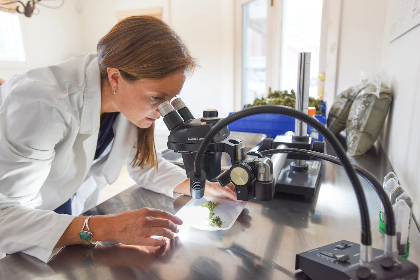(AUGUST 26, 2023) In an article in Cannabis.net about the therapeutic advantages of low-THC high-CBD cannabis strains, Monique McHenry, Ph.D., assistant professor of pharmacology and director of the Medical Cannabis Center for Research and Education, says the perception that THC is predominantly linked with the induction of psychoactive effects is a “significant misconception.”

Monique McHenry, Ph.D., assistant professor of pharmacology and director of the Medical Cannabis Center for Research and Education, examines marijuana leaves through a microscope.
(AUGUST 26, 2023) In an article in Cannabis.net about the therapeutic advantages of low-THC high-CBD cannabis strains, Monique McHenry, Ph.D., assistant professor of pharmacology and director of the Medical Cannabis Center for Research and Education, says the perception that THC is predominantly linked with the induction of psychoactive effects is a “significant misconception.”
Cannabidiol, commonly known as CBD, is a prominent cannabinoid—an exclusive class of chemical compounds inherent to cannabis sativa plants. Delta-9-tetrahydrocannabinol, or THC, represents another primary cannabinoid in cannabis sativa plants. THC holds responsibility for generating the intoxicating, psychoactive sensation often associated with cannabis. Contemporary insights have focused attention on CBD’s remarkable therapeutic and healing potential; while CBD certainly holds psychoactive properties, implying an influence on cognition, it doesn’t induce intoxication or impair functionality.
Cultivators are now directing their efforts toward crafting cannabis varieties rich in CBD, relegating THC to a secondary role, purposefully nurturing low-THC high-CBD cannabis strains to exhibit notably reduced levels of THC while boasting elevated CBD concentrations when contrasted with conventional cannabis variants. The appeal of these strains has surged due to their plausible therapeutic advantages, offering a solution for individuals in pursuit of alleviation from diverse health afflictions without encountering the potent euphoria linked to high-THC strains. It’s often asserted that CBD can aid in smoking cessation and managing conditions like diabetes, acne, Crohn’s disease, fibromyalgia, multiple sclerosis, and insomnia, among many others.
In essence, while low-THC, high-CBD cannabis holds promise for therapeutic applications, a cautious and well-informed approach is essential to navigate its use’s intricacies. A balance between individual considerations, product quality, research-based insights, and health-conscious consumption methods will contribute to a more responsible and beneficial integration of these strains into one’s wellness regimen.
Read full story
at
Cannabis.net